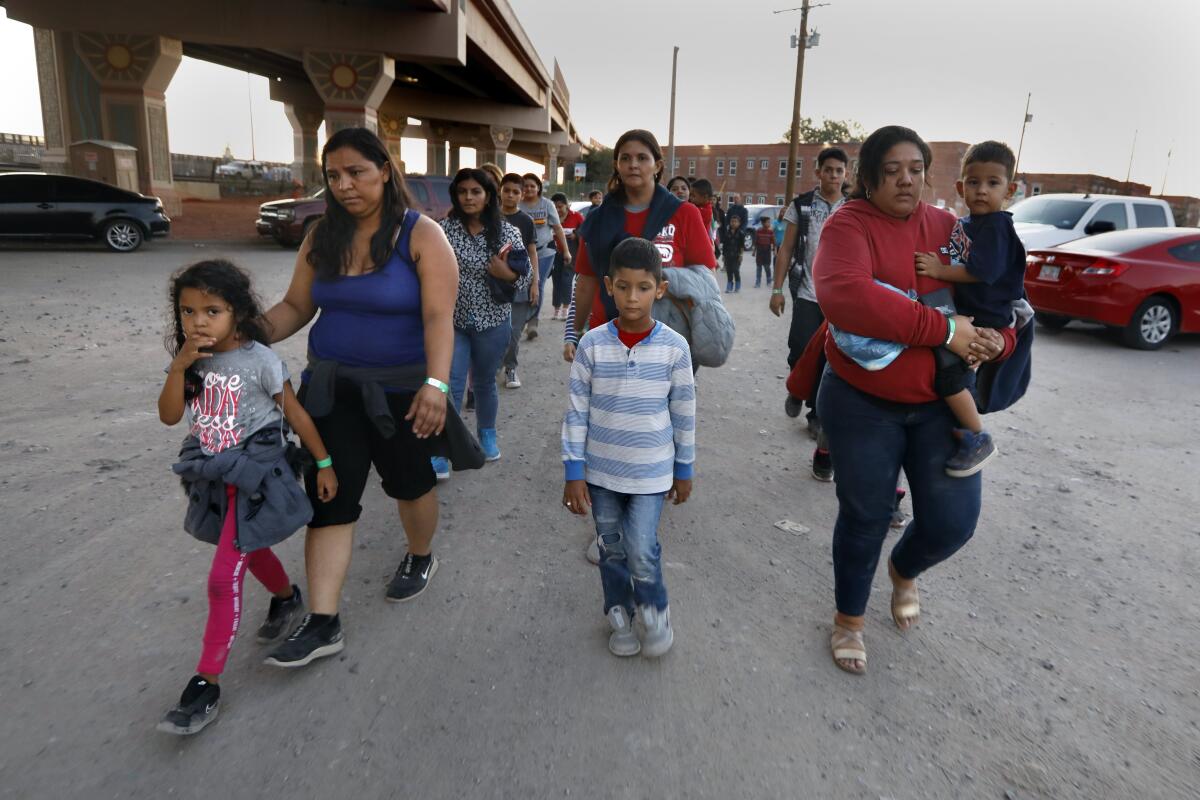Judge rejects Trump administration effort to indefinitely detain migrant families

- Share via
A federal judge on Friday blocked the Trump administration’s plan to dismantle protections for immigrant youths and indefinitely hold families with children in detention.
Those protections are granted under the so-called Flores agreement, which was the result of a landmark class-action court settlement in 1997 that said the government must generally release children as quickly as possible and cannot detain them longer than 20 days, whether they have traveled to the U.S. alone or with family members. They also cannot be held in facilities that fail to meet certain standards of care.
Advocates had sought to block the regulations when the Trump administration first proposed them a year ago. The changes, unveiled in August and primarily aimed at stemming an influx of immigrant families from Central America, would have taken effect next month.
In a hearing Friday morning in Los Angeles, U.S. District Judge Dolly Gee said the new rules violated the terms of the settlement. Gee issued a searing order shortly after, slamming the changes as “Kafkaesque” and protecting the original conditions of the Flores settlement.
Gee wrote that the administration cannot ignore the terms of the settlement -- which, she pointed out, is a final, binding judgment that was never appealed — just because leaders don’t “agree with its approach as a matter of policy.”
Barring a change in the law through Congressional action, she said, “Defendants cannot simply impose their will by promulgating regulations that abrogate the consent decree’s most basic tenets. That violates the rule of law. And that this court cannot permit.”
The new regulations would have eliminated minors’ entitlement to bond hearings and the requirement that facilities holding children be licensed by states. They also would have removed legally binding language, changing the word “shall” to “may” throughout many of the core passages describing how the government would treat immigrant children.
The government is expected to appeal.
Acting Homeland Security Secretary Kevin McAleenan said last month that the settlement is the driving factor of Central American families coming to the U.S. border.
During the hearing, an attorney for the Department of Justice asked Gee to at least allow partial termination of the Flores settlement and called the new rules a nuanced way to update the agreement.
Plaintiffs’ attorneys celebrated Friday‘s decision. Neha Desai, immigration director at the National Center for Youth Law, said she is relieved that vulnerable children will not have their rights violated by the now-halted regulations.
“It’s clear that the government is going to continue to try and find ways to eviscerate protections for unaccompanied children in whatever way they can, but thankfully the judicial branch serves as an effective check on their attempt to undermine the rule of law,” she said.
A spokesman for the Department of Justice said the administration will continue its work to “restore integrity” to the immigration system. President Trump and his supporters have repeatedly called for the closure of “legal loopholes” that they say encourage people to bring or send their children to the United States and have argued that child migrants often are used in an exploitative way as cover for illegal activity.
“The Department of Justice is disappointed that the court is continuing to impose the outdated Flores agreement even after the government has done exactly what the agreement required: issue a comprehensive rule that will protect vulnerable children, maintain family unity and ensure due process for those awaiting adjudication of their immigration claims,” the spokesman said.
Nearly 458,000 people traveling as members of families have crossed the U.S.-Mexico border since last October, four times as many as last year. Nearly 73,000 children have arrived unaccompanied by an adult in the same time period. Apprehensions peaked in May but have significantly decreased, which officials credit to agreements for stepped-up enforcement with the governments of Mexico and Central American countries.
In June, lawyers in the Flores case visited overcrowded Border Patrol facilities in Texas and found children were held for longer than allowed under the agreement and in filthy conditions, without adequate food, water and sanitation.
A spate of migrants have died in U.S. custody, and immigration authorities have consistently been found to be providing sub-standard care. Last month, doctors associated with Harvard and Johns Hopkins universities called for a Congressional probe of healthcare at border facilities. During the past year, six children have died while or after being held in government custody, three of them of the flu.
The Trump administration argues that the Flores agreement puts it in a bind amid the crisis at the southern border because no existing family detention centers meet the restrictive requirements for the treatment of minors, which forces authorities to release children while keeping their parents in custody. Administration leaders have blamed their family separation policy — which resulted in an outpouring of public anger and criticism after thousands of children were removed from their parents — on the settlement.
Gee previously had denied government requests to increase the amount of time that children can be detained. In her order Friday, she wrote that DHS attorneys’ arguments were merely “thinly-veiled motions for reconsideration of prior orders rejecting similar arguments.”
The judge wrote that she would not “reiterate yet again why an increase in numbers of families detained at the southern border does not justify, much less require, dissolution of the parties’ bargained-for agreement to treat all minors in defendants’ custody with dignity, respect, and special concern for their particular vulnerability as minors.”
More to Read
Sign up for Essential California
The most important California stories and recommendations in your inbox every morning.
You may occasionally receive promotional content from the Los Angeles Times.














